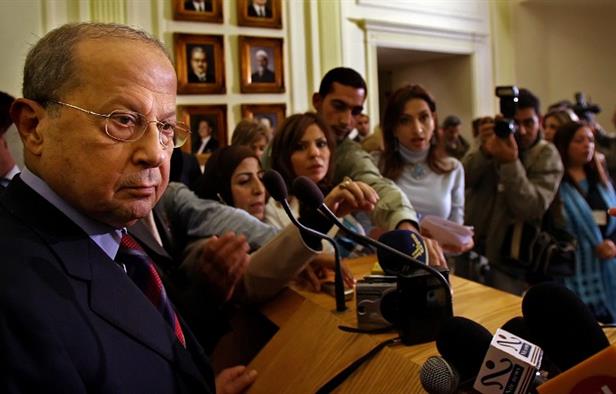المجوسي عون وحرية الصحافية
الياس بجاني/28 تشرين الأول/16
لم يعرف لبنان سياسي معادي لحرية الرأي كما هو حال المجوسي عون. الرجل طرد صحافيين من رابيته اللاهية وأهان كثر منهم ومنع بعضهم من الدخول اليها وتعامل مع الصحافية بعدائية وفجور وقلة أدب واحترام. هل عون في القصر الرئاسي سيكون مخلوقاً آخراً وهو كرئيس يتمتع بحماية من القانون تتيح له مقاضاة الصحافيين؟ في عمر ال 85 لا يتغير الإنسان وعون شاب على ما نشأ عليه من مركبات حقد ونقص واستهتار بالراي الآخر المعارض له.. وهو في القصر كما نتوقع سيكون رئيساً كارثياً ومسخرة بامتياز مع العلام والإعلاميين. في اسفل مقالة تتناول مفاهم وتصرفات المهووس مع الإعلاميين
Will President Aoun respect press freedom?
Alex Rowell/Now Lebanon/October 27/16
The General, known for bust-ups with the press, will soon enjoy new legal powers to prosecute all who “violate [his] dignity”.An exaggeration, perhaps, although given the track record of Gen. Michel Aoun during his three decades in and out of power, it may be unsurprising that concerns are being raised by Lebanese reporters and media freedom activists that, if he is indeed elected president on Monday, October 31st (as is now all but certain), his six year term could be a rocky one for the liberty of the press.
“Aoun [ruled] his tiny, dangerous fiefdom with growing dictatorial powers, prohibiting Lebanese newspapers which disagreed with his policies, [and] banning journalists who did not write what he wanted to read,” wrote the British journalist Robert Fisk in his renowned civil war account, Pity the Nation, of Aoun’s term as interim prime minister between 1988 and 1990. “Life in east Beirut was becoming more like life in Baghdad than a ‘free’ Lebanon.”
Videos from that period now available on YouTube show Aoun angrily refusing to answer questions at press conferences, snapping at journalists with outbursts such as “I object to the form of your question,” “You’re asking questions as if you’re intelligence agencies” and “Nobody ask me about this subject anymore!” That was a long time ago, it’s true, yet the General’s demeanor has shown few signs of relenting since his return to Lebanon from exile in 2005.
A sample of his more recent encounters includes cutting off MTV correspondent Joyce Akiki mid-question at a press conference last year at his home in Rabieh, then banning her from returning; forbidding LBC correspondent Bassam Abou Zeid from entering a press conference in 2007 and blacklisting him from Rabieh for nine years; haranguing several journalists at length during one-on-one interviews, telling one she “repeatedly violated the fundamentals of interviewing” and needed “a media course;” telling Radio Free Lebanon correspondent Abdo Mata, “Get off my back, you’re not a journalist, you’re a troublemaker;” and joking that if his party wanted to “respond” to one of its rivals, “we’d have burned their television station down a long time ago.”
Perhaps more significantly, he’s also been an energetic pursuer of legal action against journalists, reportedly winning nine defamation prosecutions in one six-month period alone in 2014 (and netting over $100,000 in compensation).
Unfortunately for reporters, as president Aoun would have even more legal ammunition to go after them, if he chose to. Articles 384, 386 and 388 of the Lebanese Penal Code criminalize, respectively, the “disparagement,” “defamation,” and “libeling” of the head of state, mandating jail sentences ranging from one month to two years. Article 23 of the Publications Law, moreover, criminalizes “the violation of presidents’ dignity” (including foreign presidents), allowing for jail sentences of up to three years.
In February 2014, a web developer named Jean Assy was sentenced to two months’ imprisonment over messages posted via Twitter about the previous president, Michel Suleiman, for what the judge called “the libel and defamation of the president […] and the disparaging of his person and molestation of his dignity.” Though no journalist has been sentenced under these charges in recent years, it’s the prospect that Aoun and the courts could start interpreting the concepts of personal disparagement and dignity molestation in creative ways that has press freedom watchdogs most worried.
“Our real concern is if Aoun resorts to some of the very antiquated articles of the penal code and publications code in Lebanon, and judges decide to implement these articles with a very strict mindset that is not open to freedom of expression,” said Ayman Mhanna, director of the Beirut-based Samir Kassir Eyes (SKEyes) Center for Media and Cultural Freedom, which monitors violations of free expression and campaigns for legal reform. “The real issue is what will judges do if the prosecutor general decides to enforce these articles?”
Ideally, Mhanna told NOW, these Draconian lèse-majesté laws would be removed from the penal code altogether, and become a matter for civil courts. “As long as any article related to libel, slander and defamation is in the penal code, we have a problem […] the whole text needs to be revised.” With little chance of that occurring between now and Monday, however, journalists have few options but to hope a newly presidential Aoun will choose to adopt the thick skin and magnanimity of a statesman. In remarks to NOW, a spokesperson for Aoun’s political movement, Habib Younes, was able to offer partial assurances. “The General believes more than anyone in respecting differences of opinion,” said Younes. “You have the right to say that some law the president enacted isn’t good, or you don’t like this project or idea, 100%, and he’ll congratulate you.”
When it comes to “insults,” however, a line had to be drawn, Younes told NOW, citing the example of Paul Chaoul, sued by Aoun in 2008 for an article in which he played on Aoun’s surname to suggest the Arabic word for a dog barking.
“When someone says he’s barking, what should he tell him, should he pray for him?” said Younes. “Or send someone to beat him like the days of the militias? Of course not. The judiciary is the best and most peaceful way for one to obtain one’s rights.”
Asked by NOW about the “violation of the presidents’ dignity” law, Younes replied, “This is the law […] if this republic wants to straighten up and stand on its two feet, we have to adopt the constitution and the law […] and it’s incumbent on the public prosecutor to act in the event of any violation of the president’s dignity.”As for whether Aoun might potentially use such a law to silence legitimate political criticism, Younes said “Inshallah (God willing) that won’t happen.”
“But, in principle, there’s a chair, which is a symbol for all of Lebanon, and it must be respected.”*Amin Nasr contributed reporting.






















